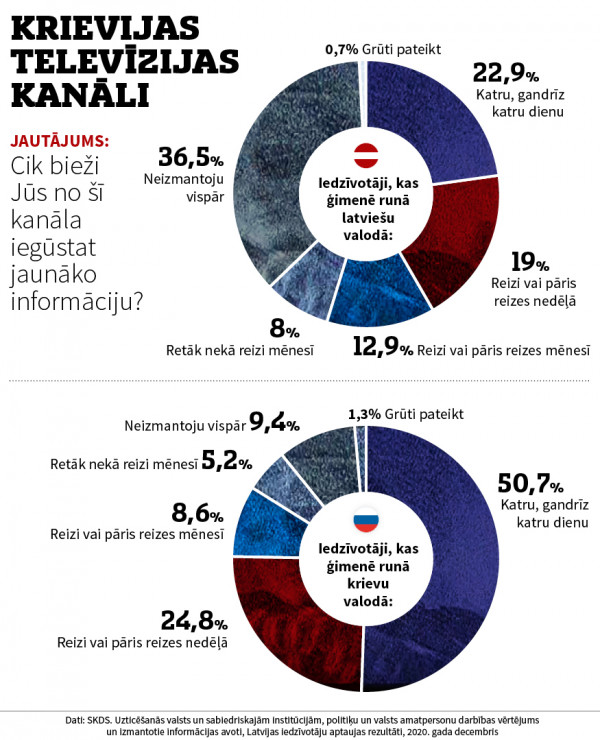The habit of watching Russian TV is as stable as the Kremlin
More than half of the Latvian population regularly consumes the content of Russian television channels. Latvian families are dominated by content created by domestic media, while Russian families are dominated by content made in Russia. On the other hand, young people hardly use traditional media - television and radio - at all. Such an image emerges in the study commissioned by Neatkarīgā "Trust in Institutions, Evaluation of the Activities of Politicians and Sources of Information Used".
The annual survey is conducted by SKDS. Regarding media use, respondents were asked various questions focusing on their sources of information. And the results show a relatively high intensity of Russian media use. 33.6% of Latvians watch Russian television every day. Slightly less in the Latvian audience - 22.9%, more in the Russian audience - 50.7%. If "once or a couple of times a week" is counted as regular viewing, then the numbers grow significantly - 55% of Latvians and 75% of Russians consume Russian TV.
False messages, limited impact

An understanding of the population's media consumption habits is necessary not only for the successful management of the media and advertising business but also from the point of view of state interests. It can be assumed that when people consume their country's information channels, their loyalty and interest in the country's development is promoted. Meanwhile, there are other narratives in the Russian media, including those openly hostile to the Latvian state and its policies. They have been found in various scientific studies and are also mentioned in the 2018 Saeima report “Russia's influence in the Latvian information space”. Here are examples of these messages: There is systematic discrimination against the Russian ethnolinguistic group in Latvia. Latvia is a failed state. Ukraine itself is to blame for the occupation and annexation of Crimea. NATO forces in the Baltic States are occupying forces. The USSR times were positive. And in general - fascism and Nazism are being reborn in Latvia.
These are false messages that benefit the Kremlin's compatriots.
However, the notion that such brainwashing causes immediate and irreversible damage to patriotic intelligence is exaggerated.
Patriots are watching it too
Yes, we have to worry about the widespread consumption of Russian media by the Latvian public, but it is not quite that people believe everything they hear. For several years, state institutions have been conducting population loyalty surveys for the needs of the defense department, including measuring the number of people willing to defend the Latvian state with weapons in their hands. This year too, under the auspices of the Latvian National Defense Academy, a study “The Will of Latvian Society to Defend the State: Facilitating and Obstructive Factors” has been published. And it also analyzes the aspect of media consumption, concluding that Russian media narratives do not have such a direct effect:
“In the group of respondents who would definitely leave the country in case of a military attack, one can find slightly lower Latvian media consumption and slightly higher consumption of Russian state-controlled media than in other groups, however, the fact that in the group of respondents who in the event of a military attack would be ready to defend Latvia with weapons in their hands, 32% admit that they consume Russian state-controlled media content, does not allow claiming that the consumption of Russian state-controlled media content would significantly reduce the will of the Latvian population to defend their country."
Russia - a threat or a friend?
Ieva Bērziņa, a co-author of the study conducted by the Center for Security and Strategic Research, explains that the Russian media is used more as a source of entertainment and news, moreover, they are relatively rare to use our country as the main news:
"We may feel that the Russian media is full of hostile information about Latvia, but in reality it is scarce." However, this does not mean, of course, that the peculiarity of our information space with the wide presence of Russian information would not be a problem, as it is directly related to the people's perception of Russia - as a threat or a friend.
And the fact that this presence is really extensive is also confirmed by the SKDS study commissioned by Neatkarīgā. Russian television channels are regularly used by both Russians and Latvians, and the age aspect is also important. In the study, this limit is 45 years. Among younger people, the consumption of Russian channels is twice as low. This may indicate that younger people have a weaker knowledge of Russian and are therefore motivated to watch domestic or foreign television, but not Russian. The younger people are, the lower the consumption of Russian media. In the age group under 24, they are only two to three percent among both Latvians and Russians. However, this is linked to another phenomenon that deserves increased attention from the media industry and the government. Young people hardly consume traditional media at all. So they need to be addressed differently and through other channels.
